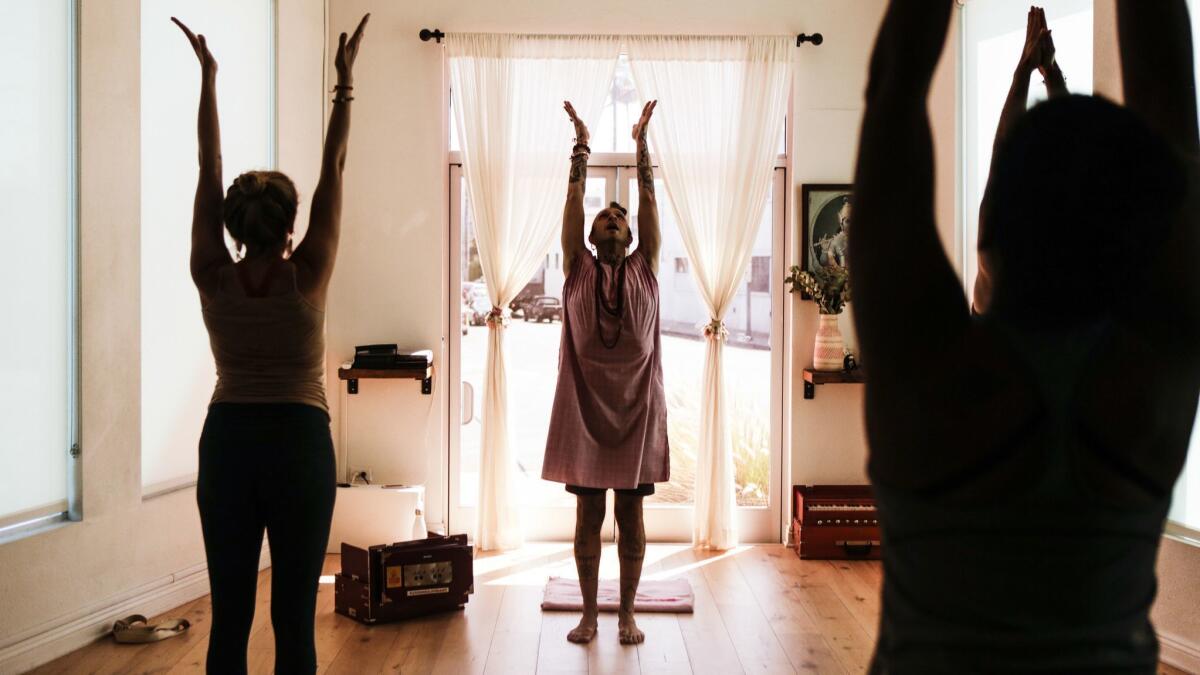Yoga equals Southern California, but not the way you think it does

- Share via
It took 28 years of living in Los Angeles before I finally went to a yoga class. In a Mid-City studio, I stretched while soft music played and sunlight scored the exposed brick walls. I could not have felt like more of a Southern California stereotype. Surrounded by flexible bodies (more flexible than mine), I imagined myself an extra in a commercial for the idealized West Coast life.
“And with this we conclude your conversion to Angeleno,” a friend commented after I posted about it on social media. Another chimed in: “It’s optional in L.A.? I thought it was required.”
Ha, ha, ha, I thought. Very funny.
In reality, however, the stereotypes were inescapable. I had come to yoga, after all, at the urging of my shrink, who wanted me to work on breathing, to learn to use my diaphragm and not my chest. This, she kept insisting, would help to mitigate anxiety.
Like yoga, Los Angeles necessitates practice, a series of hard poses in real time.
Yoga? Breathing? Maybe it would be worthwhile, although I remained skeptical. It’s not that I don’t believe in the benefits of self-improvement, but the trappings put me off. In that yoga studio, however, I came to realize that my doubts were mere clichés as well.
It is in the doing, after all, that yoga reveals itself. Only after I had tried (and, more often than not, failed) to arrange my body into Downward Facing Dog or Child’s Pose was I forced to acknowledge that the point here wasn’t soft music and body tone. Yoga is less a matter of self-improvement, at least initially, than self-confrontation. Very difficult work.
Something similar reflects my experience of Los Angeles, which makes the whole yoga = Southern California notion exactly right and also wrong. This city was literally wrestled out of the Earth by force of will. It’s mostly sunny, yes. And superficially, anyway, it can seem placid, but it’s a mistake to characterize it as laid back. What would this place be without extreme effort? An arid semi-desert stretched across a bowl of tar and sand.
Travel writer Jan Morris saw beyond those sunny surfaces. She called Los Angeles the “know-how city”: the epitome of a built environment, of overlapping sprawl and infrastructure inspired by greed and industry, in a constant state of reinvention and of growth.
The latter sort of transformation is what I was after when I put on my sneakers and my gym shorts and went off to the studio. I was with my wife, who has been doing yoga on and off for decades, so we chose a mixed-level class. Within five minutes, I wanted to quit. I don’t know what I’d been expecting, but what I got was complicated and painful, revealing my limitations and only dimly my possibilities.
That too reminds me of Los Angeles. I’m probably not alone, among those who have come here from elsewhere, in wanting to quit the city almost as soon as I arrived. For months — years even — I felt unsteady, forced into a posture I couldn’t master. I didn’t understand the landscape, couldn’t find the neighborhoods, the signs of ordinary life.
I thought I was looking at the city, but what I was seeing were the clichés. All that sprawl, all that glitz and glamour — it’s not Los Angeles exactly. Or more precisely, not completely. The city is far more engaging and complex. Like yoga, Los Angeles necessitates practice, a series of hard poses in real time.
Enter the Fray: First takes on the news of the minute »
“Taking up yoga in the middle of your life is like having someone hand you a dossier about yourself,” Claire Dederer writes in “Poser: My Life in Twenty-Three Yoga Poses.” “A dossier full of information you’re not really sure you want.”
For me, that information included pain, exhaustion and frustration, from beginning to end. How could I work on my breathing when I could barely catch my breath?
Still, as with Los Angeles, I didn’t quit. I kept torquing my body to find at least an approximate angle of repose. “Be careful,” the instructor told me. “You don’t want to get injured.”
As he spoke, the music switched and I recognized the theme from “Chinatown.” The soundtrack made me smile. “Chinatown” is all about Los Angeles in the act of becoming, uncovering secret information. Not unlike what I was learning in yoga class.
Then the instructor barked a series of poses I couldn’t do. I took the deepest breath I could muster and tried to bend into a new shape, which is, as it has ever been, what Los Angeles demands.
David L. Ulin is a contributing writer to Opinion.
Follow the Opinion section on Twitter @latimesopinion and Facebook
More to Read
A cure for the common opinion
Get thought-provoking perspectives with our weekly newsletter.
You may occasionally receive promotional content from the Los Angeles Times.










